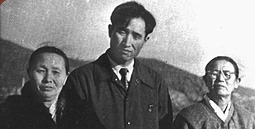|
Anticommunism has expressed itself in a variety of fashions. A populist version of anticommunism consisted of citing the atrocities perpetrated by Stalin, Mao, Castro, and Khrushchev. One could always counter this line of criticism by maintaining that Stalin and Mao et al had strayed from "real Marxism." One could also remind such critics of the human rights violations of "anticommunists" such as the Dominican Republic's Trujillo, Haiti's Duvalier, or the racist oligarchies of South Africa past. From an ideological perspective, it was also true that, for communism, dictatorship was only appropriate during the transition from socialism to communism and was thus not a permanent Marxist institution. On the other hand, "imperialist client states" institutionalized repression indefinitely, based on a suspect apologetic that "threats" to National Security existed.
In late March 1972 Reverend Moon visited his nascent Church community in Paris, France where this writer had met and joined the Unification Church. Reverend and Mrs. Moon stayed with us for three days. For many hours on each day of the visit, Reverend Moon spent time sharing and fielding difficult questions from French skeptics. On the second day, Reverend Moon entered into a conversation that detailed his reservations about communism. I anticipated that, like the populist-oriented anticommunists whom I had encountered in the past, the Reverend would comment on the number of people Stalin had killed while he governed the USSR or perhaps estimate the number of books that Marx had absconded from the British Museum while he conducted research for Das Kapital. Needless to say, this line of argument would not have impressed me.
To my relief, Moon did not engage in ad hominem attacks to justify his opposition to Marxism. Instead his exposé focused on the core underpinning of the Marxist ideology—the materialist dialectic—demonstrating that it was intrinsically flawed, based on its misunderstanding or its misrepresentation of natural processes.
Moon introduced a corrected dialectical paradigm, demonstrating that the basis for progress within nature was not Frederick Engels' struggle of opposites but the unity and cooperation of complementary pairs: positive and negative valences in the case of atomic and molecular structures; stamen and pistil in plants; males and females in the animal kingdom; and men and women in the case of humankind. Moon pointed out that, in nature, pairs thrived on harmonious interactionrather than on conflict, as Marxism had posited through its emphasis on the primacy of struggle over unity in the Marxist dialectic (unity and struggle of opposites).
For me Moon's critique was simple yet disarming. My attitude toward Marxism changed forever. Through that encounter, I realized that no matter how sincere and sacrificial Marxists might be they could never effect genuine social change. Their ideological paradigm was inconsistent with the realities of the natural processes that they portended to mirror.
History, I believe, will acknowledge that the Reverend Sun Myung Moon did more than develop a penetrating critique and counterproposal to Marxism. The organizations that he founded and the panoply of activities pursued through those organizations played a pivotal role in ending the Cold War. The essays that follow hopefully document the significance of his contribution.
In this text, I have limited my observations to personal experiences and recollections as well as to materials and documentation readily available in English, French, Spanish, and, in rare cases, Russian and Korean. I have tried to compile a set of writings that are relevant for specialists and laymen alike. The result is necessarily an indictable mélange of erudition and populism. In spite of this limitation, I hope that these essays provide readers a perspective on how Sun Myung Moon addressed Soviet expansionism. In the future I look forward to collaborating with others to go beyond this introductory work and undertake a more complete study of the theme. I welcome any and all feedback on the present effort.
|





